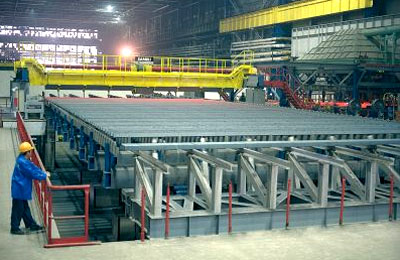
Egyptian Steel eyes big leap in capacity, IPO
Cairo, October 27, 2013
Egyptian Steel is preparing for an initial public offer of its shares in 2015 and is on track to boost its production capacity several-fold by then, chairman Ahmed Abou Hashima said.
The company's ambitions underline an important truth for Egypt's economy: although many businesses have cut investment during the political turmoil of the past two years, they are ready to revive it quickly if stability returns.
The economic slump since President Hosni Mubarak was overthrown in February 2011 has created a massive deficit of investment in the country of 85 million people, in areas ranging from heavy industry to services and basic infrastructure such as roads and power generation.
If Egypt's army-backed government succeeds in its plans to draft a new constitution and hold parliamentary and presidential elections early next year, the political environment may become stable enough for companies such as Egyptian Steel to pour billions of dollars into the economy.
"The market in Egypt is very promising and I believe in this market," Abou Hashima, 38, said in an interview at the Reuters Middle East Investment Summit. He cited Egypt's large population and unsatisfied consumer demand.
MERGER
Egyptian Steel was established in 2010, a year before Mubarak's overthrow, as a joint venture between Egyptian and Qatari interests that brought together three existing firms. Egyptian Steel now has capital of about 2 billion Egyptian pounds ($290 million), said Abou Hashima, who started his career as a steel trader in the 1990s.
The economic slump and disarray in the government since 2011 have hurt demand for cement and steel used in building infrastructure and luxury housing. Steel mills and other energy-intensive industries have faced power cuts or been forced to buy electricity from private suppliers at high prices.
But the failure of post-Mubarak administrations to enforce building regulations triggered a boom in construction of low-cost housing, which has buoyed steel firms. Ezz Steel , Egypt's biggest steel maker, said last week that its group net profit jumped 76 percent from a year earlier in the second quarter of this year.
The army-backed government, which took power after Islamist President Mohamed Mursi was ousted in July, is now promising to resolve problems such as the power shortages, using $12 billion in aid promised by Egypt's wealthy Gulf Arab allies.
A rise in the stock market, up 25 percent since Mursi was overthrown, is a tentative sign of growing confidence in the business sector. If it continues, the market could regain its role as an important financing source for companies such as Egyptian Steel; Egypt's last IPO was in November 2010.
"I expect it in 2015. I'm preparing myself from now," Abou Hashima said of the Egyptian Steel IPO, adding that he would want to float between 25 and 30 percent of the company.
EXPANSION
The next expansion step for Egyptian Steel, which now produces about 300,000 tonnes of steel a year at a plant in Port Said, will be the opening of an Alexandria plant with capacity of 250,000 tonnes.
"The factory in Alexandria was supposed to open in June but there was a delay because of (the mass protests that led to Mursi's overthrow) and delays in gas and electricity delivery to it. It will open in November," Abou Hashima said.
Two more plants in the Nile city of Beni Suef and Ain Sukhna on the Red Sea coast are due to open in early 2015, he said. The company's total production capacity is to hit 2 million tonnes by 2017.
Financing has been hard for many Egyptian companies as banks have become risk-averse since the 2011 revolution, but it is not impossible. Abou Hashima said the firm's expansion plans would cost about 5 billion Egyptian pounds; shareholders have already contributed 2 billion pounds and the firm signed for bank loans worth about 1.1 billion pounds last week. The rest of the money is to be raised via more loans and shareholder contributions.
The fate of heavy industry in Egypt has long depended to a large degree on the government, which has provided subsidies and regulatory support, and in many cases held large stakes in companies.
Abou Hashima said Egyptian steel also hoped for government support in the form of anti-dumping tariffs on steel imports, especially imports from Turkey.
Egypt's trade ministry said last month that it was studying the possibility of imposing anti-dumping duty on Turkish steel imports. Relations between Egypt and Turkey have deteriorated since the overthrow of Mursi, who had close ties with Istanbul.
Cairo's diplomatic relations with Qatar, which was a major supporter of the Mursi administration, have also deteriorated. But Abou Hashima said this would have no effect on his business. – Reuters







